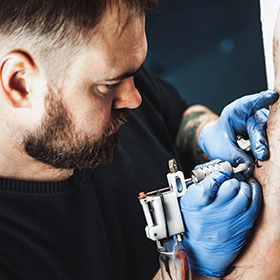Yes, Dawn dish soap can be safe for tattoos. But, it needs proper use.
Getting a tattoo is a big decision. Taking care of it is just as crucial. Many people wonder if they can use Dawn dish soap to clean their new ink. It’s a common household item. But, is it gentle enough for fresh tattoos?
Proper aftercare ensures your tattoo heals well and looks vibrant. Using the wrong product can cause irritation or infection. This blog will explore if Dawn dish soap is a good choice. We’ll also cover some tips for tattoo aftercare. Let’s find out if this popular dish soap is the right pick for your new tattoo.
Introduction To Dawn Dish Soap
Dawn dish soap has been around since the 1970s. It is known for its strong cleaning power. Many people use it to clean dishes and greasy surfaces. Some even use it to clean animals. It is very gentle yet very effective.
Dawn dish soap contains surfactants. These help to break down grease. It also has water, a few fragrances, and some colorants. The soap is designed to be tough on grease but gentle on hands. These ingredients are chosen carefully to ensure safety and effectiveness.
Tattoo Aftercare Essentials
Proper care is crucial for new tattoos. It helps avoid infections and keeps the tattoo looking good. Clean the tattoo gently. Do not use harsh products. Follow your artist’s advice. Use a mild, fragrance-free soap. Keep the tattoo moisturized. Do not pick at scabs.
There are many aftercare products. Popular options include antibacterial soap, unscented lotion, and tattoo-specific ointment. Antibacterial soap helps prevent infection. Unscented lotion keeps skin soft. Tattoo ointment aids healing. Always choose gentle and fragrance-free products. Avoid harsh chemicals.
Dawn Dish Soap In Tattoo Aftercare
Many people trust Dawn dish soap. They believe it is gentle. It can clean without harming the skin. Some say it helps new tattoos heal well. It removes dirt and oils. This keeps the tattoo clean and healthy.
First, wet your tattoo with warm water. Then, apply a small amount of Dawn soap. Use your fingers to gently rub. Rinse the soap off with warm water. Pat the tattoo dry with a clean towel. Do this twice a day for best results.
Potential Risks Of Using Dawn Dish Soap
Many people have sensitive skin. Tattoos can make skin even more sensitive. Dawn dish soap has strong chemicals. These can irritate new tattoos. Redness and itching may occur. In severe cases, rashes and swelling can develop. Always choose a gentle soap for tattoo care.
Dawn dish soap contains harsh chemicals. These chemicals can harm new tattoos. They might cause colors to fade. Tattoo ink is delicate. Chemicals can also cause infections. Using tattoo-friendly products is safer. Always read the ingredients. Protect your tattoo with the right care products.
Expert Opinions On Dawn Dish Soap
Dermatologists say Dawn Dish Soap can be too harsh. It may strip the skin’s natural oils. This can cause dryness and irritation. Fresh tattoos need gentle care. Harsh soaps can damage the healing skin. Always use a product made for tattoos. This keeps the skin healthy and the tattoo bright.
Tattoo artists also advise against using Dawn Dish Soap. Fresh tattoos are like open wounds. They need special care. Gentle, fragrance-free soaps are best. Dawn can cause redness and swelling. This may harm the tattoo. Artists recommend soaps made for sensitive skin. This protects your new ink.
Alternatives To Dawn Dish Soap
Gentle cleansers are great for cleaning tattoos. They are soft on skin. Using gentle cleansers helps avoid irritation. Look for products that are fragrance-free. Fragrances can harm new tattoos. Choose a mild cleanser that is also alcohol-free. Alcohol can dry out the skin and affect healing.
Natural products are another safe choice. Coconut oil is popular for tattoo aftercare. It keeps the skin moist and helps healing. Aloe vera is also a good option. It cools the skin and reduces redness. Shea butter can be used to keep the tattoo hydrated. Make sure to use pure products without added chemicals.
Steps For Safe Tattoo Cleaning
Clean your tattoo with gentle hands. Use warm water, not hot. Hot water can hurt the skin. Dawn dish soap is mild. It can remove dirt well. Rinse the tattoo well. Pat it dry with a clean towel. Don’t rub hard.
Consider using Dawn dish soap. It is gentle and effective. Other mild soaps can work too. Choose products with no fragrance. Avoid harsh chemicals. These can irritate the skin. Keep your tattoo clean and moisturized. This helps it heal faster.
Conclusion And Final Thoughts
Dawn dish soap is gentle on skin. It helps clean tattoos without irritation. Its mild formula is safe for new tattoos. It keeps the area clean and prevents infection. Use a small amount with water. Pat dry with a clean towel.
Always follow your tattoo artist’s advice. Use Dawn soap in moderation. Avoid scrubbing the tattoo hard. Keep the tattoo moist with a good lotion. Watch for any signs of irritation or infection. If unsure, consult a professional. Safe cleaning helps your tattoo heal beautifully.
Conclusion
Dawn dish soap can be used for tattoos, but with care. It cleans gently. Always consult your tattoo artist first. They know best. Proper aftercare ensures your tattoo heals well. Avoid harsh soaps. They can irritate. Keep your tattoo clean and moisturized.
This helps in the healing process. Following these tips will protect your new ink. Always prioritize your skin’s health. Your tattoo will look better for years.

